Best Transportation Lawyers in Netherlands
Share your needs with us, get contacted by law firms.
Free. Takes 2 min.
Or refine your search by selecting a city:
List of the best lawyers in Netherlands
About Transportation Law in Netherlands:
Transportation law in the Netherlands covers various aspects related to the movement of goods and people within the country. This can include traffic regulations, public transport laws, road safety guidelines, and more. It is important to have a basic understanding of these laws to ensure compliance and avoid legal issues.
Why You May Need a Lawyer:
There are several situations in which you may require legal assistance in transportation matters. This can include accidents, disputes with insurance companies, issues with licensing or permits, contract disputes, and more. A lawyer can help navigate the complex legal system and protect your rights.
Local Laws Overview:
In the Netherlands, transportation laws are governed by various regulations at both the national and local levels. Some key aspects include traffic laws, regulations for public transportation services, rules for commercial vehicles, and environmental regulations for transportation activities. It is important to be aware of these laws to avoid legal complications.
Frequently Asked Questions:
Q: What should I do if I get into a car accident in the Netherlands?
A: If you are involved in a car accident in the Netherlands, you should contact the police and exchange information with the other party. It is also important to seek medical attention and contact your insurance company as soon as possible.
Q: Are there specific regulations for cycling in the Netherlands?
A: Yes, the Netherlands is known for its cycling culture, and there are specific regulations for cyclists. This includes rules for bike lanes, traffic signals, and safety equipment. It is important to follow these regulations to avoid fines and accidents.
Q: Do I need a special license to drive a truck in the Netherlands?
A: Yes, driving a truck in the Netherlands requires a special license called a Category C or C1 license. These licenses have specific requirements and training programs that must be completed before you can legally operate a truck.
Q: Can I challenge a traffic ticket I received in the Netherlands?
A: Yes, you have the right to challenge a traffic ticket in the Netherlands. You can contest the ticket in court and present evidence to support your case. It is advisable to seek legal advice to increase your chances of success.
Q: Are there regulations for public transportation services in the Netherlands?
A: Yes, public transportation services in the Netherlands are regulated by specific laws and regulations. This includes safety standards, fare regulations, and service quality requirements. If you have issues with a public transportation service, you can seek legal assistance.
Q: What should I do if my goods are damaged during transit in the Netherlands?
A: If your goods are damaged during transit in the Netherlands, you may be entitled to compensation. It is important to review the terms of the transportation contract and contact a lawyer to help you navigate the legal process and file a claim.
Q: Can I appeal a decision related to my transportation license in the Netherlands?
A: Yes, you have the right to appeal a decision related to your transportation license in the Netherlands. This can include license suspensions, revocations, or other administrative actions. A lawyer can help you prepare and file an appeal.
Q: How can I ensure compliance with environmental regulations in transportation activities?
A: To ensure compliance with environmental regulations in transportation activities, you should stay informed about the latest laws and guidelines. This can include emissions standards, waste disposal regulations, and fuel efficiency requirements. It is advisable to seek legal advice to ensure compliance.
Q: Are there specific regulations for transporting dangerous goods in the Netherlands?
A: Yes, transporting dangerous goods in the Netherlands is subject to specific regulations to ensure safety and prevent accidents. This includes proper labeling, packaging, and handling procedures. It is important to adhere to these regulations to avoid legal consequences.
Q: What rights do I have as a passenger in public transportation in the Netherlands?
A: As a passenger in public transportation in the Netherlands, you have certain rights, including safety, timely service, fair pricing, and accessibility. If you encounter issues with a public transportation service, you can seek legal advice to protect your rights and seek compensation.
Additional Resources:
For more information on transportation laws in the Netherlands, you can visit the Ministry of Infrastructure and Water Management website. They provide resources and guidelines related to transportation regulations in the country.
Next Steps:
If you require legal assistance in transportation matters in the Netherlands, it is advisable to consult with a qualified lawyer who specializes in this field. They can provide guidance, support, and representation to ensure your rights are protected and help you navigate the legal process effectively.
Lawzana helps you find the best lawyers and law firms in Netherlands through a curated and pre-screened list of qualified legal professionals. Our platform offers rankings and detailed profiles of attorneys and law firms, allowing you to compare based on practice areas, including Transportation, experience, and client feedback.
Each profile includes a description of the firm's areas of practice, client reviews, team members and partners, year of establishment, spoken languages, office locations, contact information, social media presence, and any published articles or resources. Most firms on our platform speak English and are experienced in both local and international legal matters.
Get a quote from top-rated law firms in Netherlands — quickly, securely, and without unnecessary hassle.
Disclaimer:
The information provided on this page is for general informational purposes only and does not constitute legal advice. While we strive to ensure the accuracy and relevance of the content, legal information may change over time, and interpretations of the law can vary. You should always consult with a qualified legal professional for advice specific to your situation.
We disclaim all liability for actions taken or not taken based on the content of this page. If you believe any information is incorrect or outdated, please contact us, and we will review and update it where appropriate.
Browse transportation law firms by city in Netherlands
Refine your search by selecting a city.














